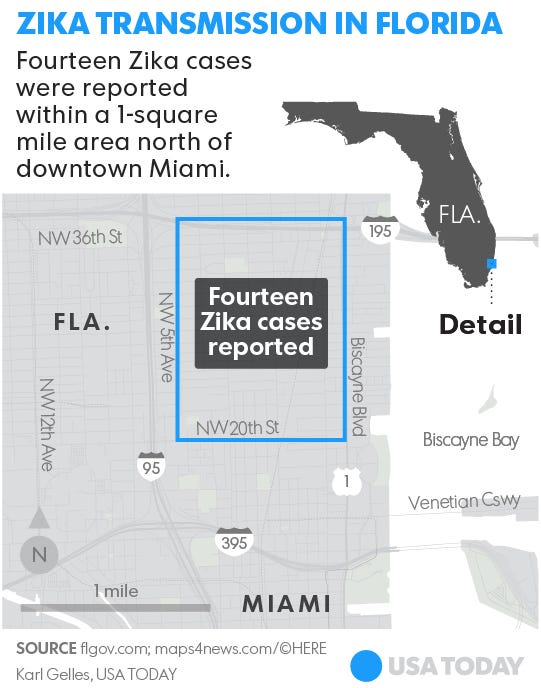Zika Q&A: What you need to know about the virus

Florida officials believe Zika is now spreading in the Miami area, marking the first time that the virus has been spread by local mosquitoes in the continental USA. Previously all cases were linked to travel to Zika-affected regions.
The virus, which is mainly transmitted via mosquito bite, is known to cause devastating birth defects.
Here's what you need to know:
Q: Where is the virus infecting people locally in the U.S.?
A: The Florida cases were found in two Miami-area neighborhoods of Wynwood and South Beach. Pregnant women and their sexual partners who are concerned about the virus could also consider avoiding "nonessential travel" to all of Miami-Dade County, according to the CDC. While mosquito bites count for the vast majority of cases, both men and women can also spread Zika through sex.

Q: How many other Americans have been infected?
A: More than 2,200 Zika infections have been reported in the U.S., but nearly all those are linked to travel to areas with outbreaks of the virus. More than 520 pregnant women in the continental U.S. have been diagnosed with Zika, along with more than 690 in the territories.

Q: How does Zika spread?
A: The virus primarily spreads through bites from infected mosquitoes, but can also be spread through sex. Zika lasts in the blood for about a week, and mosquitoes can only pick up the virus if they bite someone during that time. It's unclear how long the virus can be transmitted through sex.
Q: What are symptoms of the virus?
A: Only one in five people with Zika develop symptoms, which include rash, fever, muscle aches and headaches. The virus is not usually deadly, but people with pre-existing health problems can sometimes develop fatal complications. There are no approved treatments or vaccines currently available for Zika.

Q: What can be done to help prevent the virus' spread in the U.S.
A: Health officials are calling on residents to clean up trash, eliminate any standing water around their homes and use insect repellent to reduce the mosquito population and the chance of bug bites.
Q: What steps should pregnant women in the U.S. take to reduce risk?
A: All pregnant women in the U.S. should be assessed for possible Zika exposure during every prenatal visit, according to the Centers for Disease Control and Prevention. While they don't automatically need to be tested for Zika, health care providers should ask women about recent travel, as well as any travel by a sexual partner.
Women who are pregnant or are considering becoming pregnant should also avoid the Miami neighborhood that is the site of a Zika outbreak.
The CDC has warned pregnant women since January to avoid areas with Zika outbreaks. Until now, those travel warnings were limited to foreign countries and U.S. territories, such as Puerto Rico and the U.S. Virgin Islands.
Q: How many other countries is Zika active in?
A: The virus is active in more than 40 countries and territories, mainly in Latin American and the Caribbean. Zika is spreading locally in the U.S. Virgin Islands, American Samoa and Puerto Rico.

Q: When did the virus emerge?
A: Zika appeared for the first time in Uganda in 1947, but experts considered it a minor-league virus for decades. Health officials detected the current outbreak in Brazil in 2015.